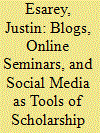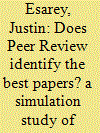| Srl | Item |
| 1 |
ID:
162862


|
|
|
|
|
| Summary/Abstract |
How do political scientists use online tools as part of their scholarly work? Are there systematic differences in how they value these tools by field, gender, or other demographics? How important are these tools relative to traditional practices of political scientists? The answers to these questions will shape how our discipline chooses to reward academics who engage with “new media” such as blogs, online seminars (i.e., webinars), Twitter, and Facebook. We find that traditional tools of scholarship are more highly regarded and used more often than any new media, although blogs are considered most important among new media. However, we also find evidence that these webinars are used and valued at rates comparable to traditional tools when they are provided in ways that meet political scientists’ needs. Finally, we observe that women and graduate students are substantially more likely than men and tenure-track academics to report that webinars and online videos are important sources of new ideas and findings.
|
|
|
|
|
|
|
|
|
|
|
|
|
|
|
|
| 2 |
ID:
155737


|
|
|
|
|
| Summary/Abstract |
How does the structure of the peer review process, which can vary among journals, influence the quality of papers published in a journal? This article studies multiple systems of peer review using computational simulation. I find that, under any of the systems I study, a majority of accepted papers are evaluated by an average reader as not meeting the standards of the journal. Moreover, all systems allow random chance to play a strong role in the acceptance decision. Heterogeneous reviewer and reader standards for scientific quality drive both results. A peer review system with an active editor—that is, one who uses desk rejection before review and does not rely strictly on reviewer votes to make decisions—can mitigate some of these effects.
|
|
|
|
|
|
|
|
|
|
|
|
|
|
|
|